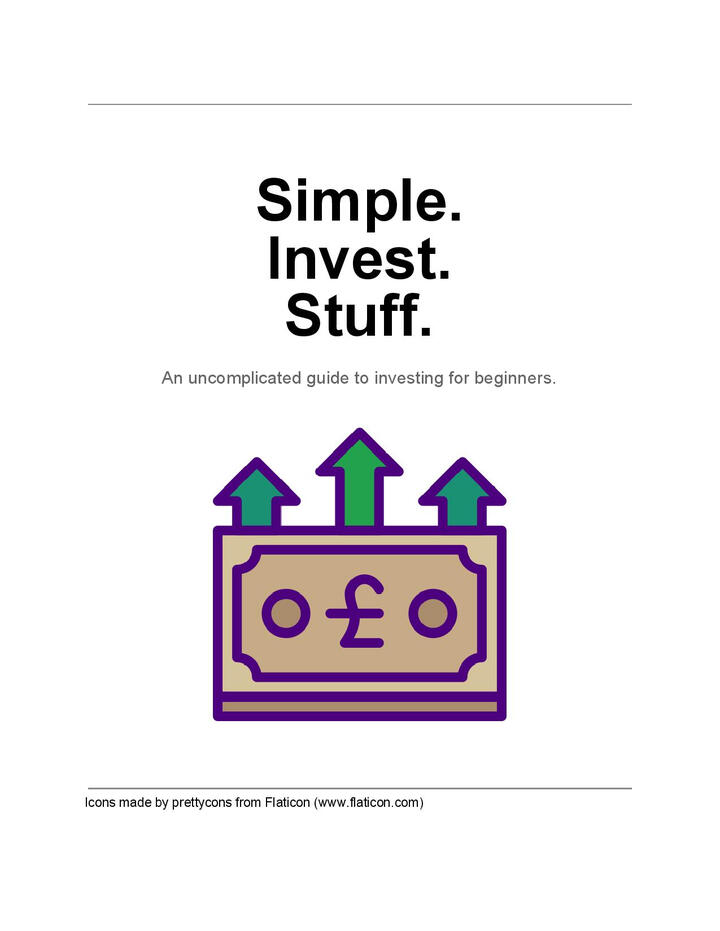Simple.
Money.
Stuff.
'start' for the simplest guides ever
These are simple guides.
Ultimately it's up to you what you do with your money. We simply thought a roadmap would be handy. We recommend clicking on 'continue journey' to understand your context a little more with our story about Ali and Joanne, after a brief introduction.
Simple. Contact. Stuff.
Got some questions? Simply contact us using this form...
© Simple.Money.Stuff. All rights reserved.
Icons made by Freepik and Prettycons from Flaticon
Message Sent
Thanks!
The story of Ali & Joanne
In the following story, we highlight two people who view money differently. Some of it may be familiar - a zoomed out overview of your money management.Ali works at a design firm and uses the latest software to produce computer models for the games industry. He has worked there 7 years and earns a wage of £24,000. That’s around £2000 a month and after taxes about £1600. He looks to his peers to determine what wealth is. He lives in a swanky flat alone, gets the best car he can on finance. and has the best home cinema system which he can afford, again on finance. Most nights he eats take away or convenience food and his lunches he buys from a convenience shop everyday. He loves to go to the pub often and shopping with his mates he considers a great pastime. Needless to say, he is often dipping into his overdraft.However, recently, he has met somebody he really likes and wants to go on holiday with them. He has also heard rumours that his company is looking to reduce staff because his colleagues have figured out how to create time saving design libraries. This is making Ali anxious. How will he pay his debts? Also house prices are increasing in his area - he will never be able to afford a house or go on holiday with his new partner... except with a loan. Things just seem really frustrating - he can’t even see progression in sight, even if he does keep his job.
Comparatively...
Joanne has worked in that very same firm for 4 years and has the same wage as Ali, but she seems much more chipper. How come? Well, she lives with a housemate in an older terraced house, in another part of town. The rent she pays is under half that of Ali and her car is the old Toyota she learned to drive in. She enjoys cycling to work for exercise and it saves her fuel costs. She'll make a big meal that she can store and reheat over the course of the week for lunch and dinner. She'll go to the pub once a week with her mates, which makes it a special tradition. Of her wage, she puts £200 a month into an investment account, she pays 3% of her wage into her company pension and puts another £50 per month into a savings account in case of her car having problems, or to buy another if she needs to, or for anything else big she may fancy. Not only has she money to spare but she has a saving buffer, and assets she can liquidate at any point.
The work redundancies worry her less. If she does end up being one of those unfortunate enough to lose their job, at least she has a buffer to pay rent while she looks for work or finds a way to use her skills to start something herself. She can withdraw her money whenever she likes. She was considering doing some side freelance work anyway!
The difference between these two stories seems obvious. Actually there's a couple of things going on here.
a) Joanne doesn't measure her wealth compared to others.
b) Joanne turns adversity into opportunity.
Her dad always told her…' be the one who is paid interest, not the one who pays it.’
She grew up around savvy people though.
Ali is more subjected to status anxiety. If he wants the best clothes, technology, or car he'll buy them before he can actually afford them. He is bound to work to keep paying his debts and measures his wealth by his per hour rate. He never had the best saving advice though, which was ‘remember to save’. This is not effective.
This isn’t anyone's fault - like the family that lives in Alps being around skiers, they are likely to know how to ski, whereas someone from the Brazilian rain forest probably won’t. The people you are surrounded by greatly affect and influence your behaviour.
Well, we're here to influence you and luckily our '8 steps to nurture your income' is next and will put you in a good position. (By the way, this is good to know, even on a lower income, just in case for you, 24k would be wishful thinking! This guidance is for anyone, anywhere.)
If you already have a bit of spare cash, head straight to our 8th step!
Introduction
At SMS, we were getting fed up with the 'type A,' folded armed, suit-wearing, hyper-male realm of money and stuff. Instead, we wanted to make a money instruction manual for the not-them-sort-of-people. We've looked at how wealthy people use money to create opportunities for themselves, then found habits that can be cultivated for any income, pretty much anywhere. We’ll cover how to get started with tips you can act on right away, some common pitfalls to avoid, and useful ways to start “snowballing” your money; this guide isn't about getting rich quick but it is about having a simple, wealth framework. (There'll be no talk of day-trading here!)
Why?
A financially independent future frees you to focus on the things that are important in life and bring you closer to being 'money mindful'.
It isn't about having millions of pounds in the bank, it's more about having a healthy relationship with money.
We are going to bring this idea to as many people as possible. A strong financial practice creates a true wealth democracy and a real sense of liberty.
It's Simple...
_‘‘Get the money… get the money… it is going to be made, it is going to be allocated, and you have a moral imperative to make sure that if you have a point of view that matters and you want to reflect it, you get it.’’ _ Chamath Palihapitiya, Money as an Instrument of Change, a Stanford Business School Interview
Simple. Resource. Stuff.
This summary and collection of resources is for the SMS convert Sometimes quick tips and links can help in 'break glass in case of...' situations.Summary - Key Points+Pay yourself, habitually. Stash money away just after payday as though you have no choice and are paying a tax.
+Earn interest, don’t pay it to other people. Use the ‘Secret Snowball’ that is a low fee investment account to grow money and avoid overdrafts, loans and finance.
+Following the herd will ironically lead you astray - don’t just buy something because it’s normal to, be it a house, car or laptop - your goals are yours. Question the motive, think, afford.
+Self start and add value everywhere. If you try to set something up, make sure its failure will provide lessons or helpful future tools/networks.
+Short term losses often lead to long term gains. No one gets 100% of what they want anyway, so deliberate ‘shortcomings’ like house sharing or borrowing your mum's car, are actually small wins. You‘ll afford what you really want later, with more bargaining power.Ingredients (Further reading, viewing and listening)Don't be fooled by cheesy looking finance books - some are pretty good! The author's smug look and folded arms may put you off, but persevere and cherry-pick the best nuggets. Don’t judge a book by it’s cover. Get kindle versions if you want to hide them on the train. Or wrap them in brown paper if you like! To help a bit, we have put a + system next to each link. The more +'s there are, the more tricky the material is. They are in order of most recommended first.Books
++‘I Will Teach you to be Rich’ by Ramit Sethi (Exceptional advice for better personal finance)
+‘Rich dad, Poor dad' by Robert Kiosaki (Highlights two different money concepts)
+‘The Richest Man in Babylon,’ by George S Clason (Timeless wealth growing idioms)
+++‘The Four Hour Work Week,’ by Timothy Ferris (Thinking differently about time utilisation)
+++‘One up on Wall Street,’_ by Peter Lynch (Why investing shouldn’t be off-putting)Youtube video series
- ‘The Joseph Carlson Show’ - by Joseph Carlson, (A specific exemplar dividend investing portfolio with tips, tricks and traits also in podcast format)
- ‘The Swedish Investor,’ - by the Swedish Investor, (Short finance and investing book summaries)
- ‘Principles for Success,' - by Ray Dalio, (How to view life as an adventure and learn from it)
Podcast
8 steps to nurture your income
The method below showcases the first steps to get you into the right mindset. We cover money growth principles in Simple. Invest. Stuff. If the instructions below seem alien, you aren't ready for that next step yet. But you will be soon...
A quick note to pay attention to - that is a) motivation doesn't work and neither does discipline. Habits work. b) The easiest habits to keep are the ones that are difficult to NOT do. So aim to make it difficult to err from the below.Method1. Pay yourself first. This sounds odd at first, but it stops 'payday' being 'spend-day'. So pay you. Use an affordable percentage of your wage and shove it in an ISA. Not only are they tax-free (up to £20k) but they usually offer better interest rates than savings accounts. Creating this habit is the most important factor in generating wealth and it's the easiest to execute. In fact, if you don't already tuck some money away, set it up now. Find a good-paying ISA and put 10% of your wage in a couple of days after payday. Do it now. After automating this step, it'll be more difficult to not put money away. It's a fundamental shift.2. Don’t get into the overdraft. Or get yourself out. ASAP. You’ll pay a hellish amount of interest to other people. You should have interest paying you, not other people. Remember, banks are just a type of financial product and they do, believe it or not, want to make money from you. Use the technique above to help you get out. Once out, create a buffer in your account and close off the overdraught. Remember it's going to be more difficult to re-allow it.3. Use the savings you have and the interest you earn to buy things. Don’t let your interest fill someone else's pockets! If there’s something expensive you like, find out the cost and use an online monthly finance calculator to see what the payments would be for a set period, like two or three years. Then put that money into your savings or investment account instead. A good investment strategy can return great interest! And, it isn't that hard... More on investments in Simple. Invest. Stuff.4. Cars. A word here on cars. Apart from a few exceptions, they are money pits, especially as a younger person. Be sensible in the short term and you’ll afford the dream vehicle in the future. Get something small, low cost, and reliable if you need one and if you can make a journey by bike or other means do that instead. This one is a real, crucial money saver and often missed by a lot of people who believe what other people think of their car actually matters. It doesn't. What matters is safety, practicality, and running costs.5. Create your own extra stream of income. This is easier to say than to do but keep trying. One day you may rely on that income and it will add value to your understanding of how and why businesses, like the ones that employ you, actually behave. If you would like to read a little more about this, we have a free one-pager included with Simple. Invest Stuff. which highlights a really simple side income project almost anyone can do.6. Get a pay rise. See the paragraph above for a way to better understand your company. Be frank but polite to your superiors, especially because you both have high expectations. Don’t just show what you’ve done for the company but what you are going to do for them too. Be valuable. Really add to your skillset. You have everything to gain doing this. Ask a supervisor to organise an appraisal, and email or notify topic points you feel that should be covered. If you've put, 'salary and future potential' you've committed to it being brought up. If it's taken off the table, maybe they aren't the company you should be working for. Don't forget, you may get a little more work or responsibility off the back of the conversation, but that is to be expected, truthfully.After a pay increase, people often ramp up outgoings by upgrading things they don't need to. DON’T FALL INTO THIS TRAP. Only buy when you can afford it. Living beyond your means scuppers your pay rise.7. Live somewhere well under budget if possible. At least initially. Set yourself a realistic budget, then reduce that by 10-20%. And when you do apply, ask for reductions. They can only say yes or no.
House share if you can, it'll care for your pocket. Initially, this advice might not be what you want to hear but will lead to your ideal home quicker. Also, live as close to work as you can. Sooo much money is spent on fuel, and that time commuting to work could be spent on one of your side projects, or, doing something else you need in your life.
We have a free home buying one-sheeter in Simple. Invest. Stuff.8. Learn to invest as means to grow your income. Warren Buffet, the exceptionally wealthy, but over-quoted chap once said, 'If you don't figure out how to make money while you're asleep, you'll be working until you die.' Although a bit extreme, it is true that your earning potential shouldn't be tied to your valuable time, you need to find a passive way to make money. Investing can do that. But it can be a scary step and it's easy to feel intimidated. It need not be - get the low-down about the simplest way to invest in Simple. Invest. Stuff. You'll laugh once you see how simple it is to do safely.Conclusion
All the efforts to save money can be tricky - these are all paths not destinations. Take advice with a pinch of salt. After all, circumstances dictate many possibilities. Just keep adding value and keep things simple. Step at a time. Bit by bit.Next
Once these methods have been read, understood and actioned, move onto Simple. Invest. Stuff. This section shows you ways to use investing to grow your money. If you're scared to invest or find it complicated, it's perfect for you.We've compiled the story and the above guide into a free to download PDF - click below to have it sent to your inbox!
Simple. Invest. Stuff.
Does the word 'Investing' scare you off???You may have heard...'Investing is dangerous and that it's like gambling. Put your money into bricks and mortar instead.'
OR
You probably deem it reserved for the type of people who read the financial times, go on BBC news extra and wear ill-fitting suits and make annoying hand gestures.
OR
The most recent type of investing stereotype - the eye-rollingly-frequent Youtuber who can 10x your wealth or get you a million pounds with one 'easy technique'. Basically, the financial worlds snake oil salesmen.And that's probably why you waited so long to do it or have been skeptical in the past and you were probably right to be so. But this barrier has hampered your earning potential, honestly.Simple. Invest. Stuff. has been made with you in mind. There are no getting rich quick promises, just time-honored techniques that are simple to understand. We've scoured all sorts of sources and condensed the stuff you need to know in an 11 page, easy-to-read PDF. And now it's free to download. Please click on the link below and you'll get Simple. Invest. Stuff. absolutely free, straight to your inbox.
£12.67
FREE!!
The techniques here are so simple, it's ridiculous it isn't taught at school. There's also a free one-pager about house buying and a one-pager about easy project ideas to generate side cash.
'I had been told that the only worthwhile investment is bricks and mortar... and been made to think I had to be a professional to understand stocks and shares. That just isn't the case! It's much more accessible than I had imagined, I I didn't need to save for years...'
Beth, aged 20, North Yorkshire
Thanks!
Check your emails - you will have received your eGuide! Enjoy the journey...
If any issues occur with your download do email [email protected]





